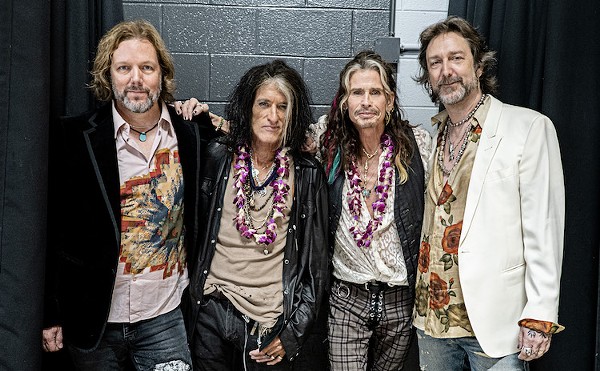Since vinyl LPs all but disappeared from mainstream music stores in the early '90s, there have been frequent stories trumpeting statistical blips that indicate records are making a comeback. For instance, when the RIAA released midyear sales numbers for 2006, vinyl's market share had doubled from 2005. (Of course that doubling was from .5 percent to a full percentage point, but still.) Surely, murmured music-nerd blogs across the land, this was an omen that the format was on the rise, soon to reclaim its place in the racks next to CDs.
Since vinyl LPs all but disappeared from mainstream music stores in the early '90s, there have been frequent stories trumpeting statistical blips that indicate records are making a comeback. For instance, when the RIAA released midyear sales numbers for 2006, vinyl's market share had doubled from 2005. (Of course that doubling was from .5 percent to a full percentage point, but still.) Surely, murmured music-nerd blogs across the land, this was an omen that the format was on the rise, soon to reclaim its place in the racks next to CDs. Since vinyl LPs all but disappeared from mainstream music stores in the early '90s, there have been frequent stories trumpeting statistical blips that indicate records are making a comeback. For instance, when the RIAA released midyear sales numbers for 2006, vinyl's market share had doubled from 2005. (Of course that doubling was from .5 percent to a full percentage point, but still.) Surely, murmured music-nerd blogs across the land, this was an omen that the format was on the rise, soon to reclaim its place in the racks next to CDs.Wrong. Vinyl will never again be a mainstream format for contemporary music. In a world filled with iPods (and iPhones), download services and 500 GB hard drives, the path toward a digital future for music distribution is set. Even CDs look positioned to suffer the same fate vinyl did in the late '80s.
But just because you won't be able to get the soundtrack to High School Musical V on wax doesn't mean that vinyl isn't making a comeback. The fact that it's held on at all through the past decade and a half is a testament to the devotion the format's fans have for it.
In 1989, vinyl LPs accounted for just over 10 percent of full-length album sales, eclipsed by CDs (with 28 percent of sales) and, unbelievably, the 62 percent stranglehold of cassettes. In 1990, vinyl accounted for about 5 percent of sales before settling, in 1993, for the .3 percent of market share the format would hang on to for the next 13 years. Cassettes would soon join LPs at the bottom of the market-share pool, but when was the last time you met a cassette collector?
The niche applications of vinyl — still the preferred format for DJs and audiophiles — have allowed many record stores to actually stock records, and a brisk trade in collectible vinyl on the Internet has made it possible for longtime stockpilers of wax to supplement their income quite nicely.
But those niche-dwellers have a tendency to fetishize records. While there's nothing wrong with insisting on specific combinations of playback equipment or with having a near-fanatical devotion to original pressings, sometimes a record — even a recent repressing played on an inexpensive turntable — just hits the spot.
With that in mind, a whole new type of record-buyer has entered the market.
"There are a few different mentalities that drive customers to analog," says Brian Tragash, a sales associate at Music Direct, an online store devoted to the needs of audiophiles. In 2004, Music Direct acquired the legendary Mobile Fidelity Sound Labs (of the "Original Master Recordings" series of high-end vinyl and CD reissues) and, according to Tragash, they've "definitely seen sales `of records` increase" recently.
"There's nostalgia, there's an audiophile's desire to experience music in high quality and, of course, there's a collector's mentality," says Tragash. "But with younger kids, it's gotten kinda fashionable `to buy records`."
Many independent labels continue pressing vinyl versions of their new releases — no punk rock store can be taken seriously without a section devoted to 7-inch singles — and recently, interest in contemporary metal has gone hand-in-hand with the enormously high resale values of vinyl outings from bands like Mastodon and Pelican. In England, vinyl sales of singles have increased tenfold since 2001; HMV spokesman Gennaro Castaldo told London's Sunday Mirror in October that the British music-store chain has "seen a huge resurgence of interest in 7-inch vinyl sales."
"The 7-inch vinyl is definitely very cool again," said Castaldo.
But the fashion goes beyond hip enclaves.
"I remember when I had such a surplus of Bruce Springsteen records, but now …" laughs Ray Ehmen, owner of Orlando vinyl store Rock 'n' Roll Heaven.
It's not just mint-condition first pressings of obscure Krautrock records that the hipsters are combing the bins for. Classic rock staples — from Led Zeppelin all the way down to dollar-rack fodder like Boston's debut — are getting the attention of young buyers.
"Boston's a good example," says Ehmen. "Personally, I can't stand 'em, but taste is taste. Here it is all these years later and that's the one everybody wants … and they want it on vinyl.
"I call it ‘flaccid rock,' not classic rock," he continues. "If you listen to the national radio stations, they play the same 620 songs over and over again. I don't know who deemed that shit ‘classic,' but it's not. `My customers` are buying that stuff, but they're also looking for all the colors and shades in between."
Ehmen is surprised by the number of obscure rock records that he sells. They're not always "obscure" in a good way.
"Would you have thought Europe records would be selling?" Ehmen laughs. "Somebody sampled something off that Europe record `1986's The Final Countdown` and that sonofabitch started selling for 10 or 15 dollars."
Why shell out a 10-spot for a full vinyl record when you can get a one-song nostalgia hit for a buck on iTunes? Does irony run that deep? Perhaps, but there's another possibility that's much more likely.
"In the mid-'90s, I wasn't really aware of why, but I thought CDs sounded wrong, something was off," says Music Direct's Tragash. "I just got frustrated and stopped listening to CDs."
The nonspecific "wrongness" of CD audio reproduction is something that may be turning people back to vinyl.
Audiophiles have always claimed that records were a superior delivery mechanism for music, constantly crowing about "warmth," "soundstage" and "dynamics" in ways that most casual music fans couldn't care less about.
In technical terms, vinyl has less of a dynamic range than CDs, due to the physical limitations of the format. So what's causing people to shun their CD collection in favor of playing a record? Simply put, the last decade has seen a confluence of mastering techniques that have made CDs louder and louder, but with less emphasis on contrasting the loud sounds with the soft ones. Record labels want their single to stand out on the radio, so they tell their mastering guy to make it a little louder than the last one; this process gets repeated ad infinitum by every record label.
These techniques aren't exactly the same as simply turning the volume knob up; instead, they ramp up all of the individual levels, giving a background cymbal crash as much emphasis as a lead guitar line. Imagine the "loudness" button on your stereo with 10 times the power; you wouldn't have to turn the volume up, but by pressing that button, your entire listening experience would be substantially different, right?
The outcome is that a large number of contemporary CDs, particularly in the rock genre, are just loud, with little emphasis on dynamics. It's the pauses between the loud bits that give your brain time to relax and catch up with the listening process. (Recording and mastering engineers grouse about this trend, but since the labels sign their paychecks, there's little they can do.) Combine that with the compression required to turn that CD into MP3s — a process which strips away "extraneous" audio information, requiring your brain to make up the difference — and you wind up with music that's exhausting to listen to.
"To my ears, it just gets grating," says Tragash. "It's like being screamed at. Very seldom do I hear people say, ‘I listened to CDs for hours last night.' But with vinyl, you end up staying up until 1 in the morning."
It's not so much that records sound better than CDs (although they do), it's just that it's a less trying listening experience. For a generation surrounded by music on their phones, their iPods, computers and CD changers, it would seem ridiculous to position a bulky, 12-inch vinyl record that needs to be cleaned regularly and stored properly as an alternative, but many younger listeners have been doing just that, perhaps as a reaction to the way the music they're hearing from those digital devices sounds.
While purists will continue to make playing records seem like a near-transcendent experience — granted, of course, everything is set up just right on your multi-thousand-dollar system — "the kids" have deemed vinyl simply to be more enjoyable. The "fetishism" over big cover art and the assertion that a vinyl record results in a "tactile engagement" with its listener are smoke screens for the fact that a lot of people — and apparently a lot more recently — just like to play records.
As Ehmen notes: "Vinyl never really went away."
|
After years of vinyl LPs being subjected to diminishing record-store real estate, a combination of vinyl-savvy shoppers and plentiful high-class reissues has made searching for it less of a hit-and-miss affair and more a well-curated record paradise. Those reissues — from artful labels like Sundazed and Four Men With Beards, as well as some of questionable legal origin — have enabled stores to stock quality pressings of hard-to-find classics. When those are added to the constant flow of new indie-label releases and the trickle of vintage used LPs that still make their way through the door, contemporary record-shopping is more rewarding than it’s been in years. Here’s a quick guide to places where you can get your vinyl fix. IN ORLANDO Drop Shop It’s focused solely on the needs of DJs, so the casual record-buyer won’t find any old CSN&Y vinyl among the wide stock of house, trance and other 12-inches, but Drop Shop does keep a good batch of cleaning supplies, styli, cartridges and other necessities to keep your turntable in shape. (2422 E. Robinson St.; 407-839-6050; www.dropshop.com) Orange Tree Antiques Mall Need a finger-blackening way to kill a few hours? Head to the back room of this strip-mall antique emporium for a dig through the thousands of $3 records one dealer has stashed (and, bless his heart, continually rotates new stock into). Check condition carefully; beautiful covers often hide disasters. (853 S. Orlando Ave., Winter Park; 407-644-4547) Park Ave CDs These guys should be commended for their renewed focus on vinyl; not just in stocking it — they recently expanded their selection, bumping T-shirts to make more space — but stocking it right. All their used records are vacuum-cleaned, an expensive but worthwhile process that ensures as much grime and dust as possible is removed from the playing surface. Plus, they’re graded accurately. An excellent selection of new indie vinyl (duh) and reissues add to the well-groomed vinyl section. They also stock supplies, and you can sign up for notifications on their MySpace page to find out when new vinyl has come in. (2916 Corrine Drive, 407-629-5293; www.parkavecds.com) Retro Records I can’t fathom how this store stays in business, unless they sell a whole lot of those vintage toys and issues of Playboy. Every time I’ve been in, I’m as creeped out by the fact that there’s never music playing as I am disappointed by the high-priced junk that fills the racks. But gems can be found if you’re willing to delve into a seemingly endless selection of ’50s and ’60s pop and ’70s soft rock. Their $2 section is worth digging through. (59 N. Bumby Ave.; 407-898-2484) Rock ’n’ Roll Heaven The big daddy of Orlando vinyl shops, Rock ’n’ Roll Heaven is as gratifying as it is frustrating. They unfailingly have that record you’ve spent years looking for, it’s unfailingly in good condition, it’s unfailingly been hand-cleaned to a high gloss and it’s unfailingly twice as much as you think it ought to be. But if you focus only on the upper end of the Heaven’s stock list, you’re doing yourself a disservice; their vast selection means that they’ve also got quite a few records you didn’t know you wanted — in that same state of cleanliness — for a song. The store is well-organized and simply packed full of records ranging from vintage ’50s garage bands and ’60s psychedelia to ’70s funk and ’80s alternative, along with a massive selection of 45s. Worth noting: Local DJ’s love Rock ’n’ Roll Heaven, and despite the staff’s best efforts, the occasional Technics-molested piece of wax does find its way into the rack. (1814 N. Orange Ave.; 407-896-1952; www.rock-n-rollheaven.com) Elsewhere in Florida Atlantic Sounds This grungy, low-key shop doesn’t clean any of their records and has only priced about half of them. Their entire back room is given over to vinyl (the front is filled with CDs and DVDs), with an emphasis on classic rock — this is Daytona — but I managed to pick up a mint copy of I Want You by Marvin Gaye for $4 here. (138 W. International Speedway Blvd., Daytona Beach; 386-258-1420) Bananas As a front for a long- running mail-order/Internet business, Bananas is just a warehouse filled with records. It’s essentially a record library, with multiple copies of many artists’ entire catalogs. Most of the vinyl is in excellent condition and falls into a comfortable $5-$10 price range. Bring a want list (they’ll gladly sell you anything “reserved” for the ’net) and plan on spending the day. (2226 16th Ave. North, St. Petersburg; 727-343-4013; www.musicfinder.com) Sound Exchange A solid selection of lots of genres, with the best and biggest 99-cent section I have ever seen. Records are priced incredibly fairly and tend to be in excellent — if uncleaned — condition. (1426 N. Nebraska Ave., Tampa; 813-978-9316) — JF |
















